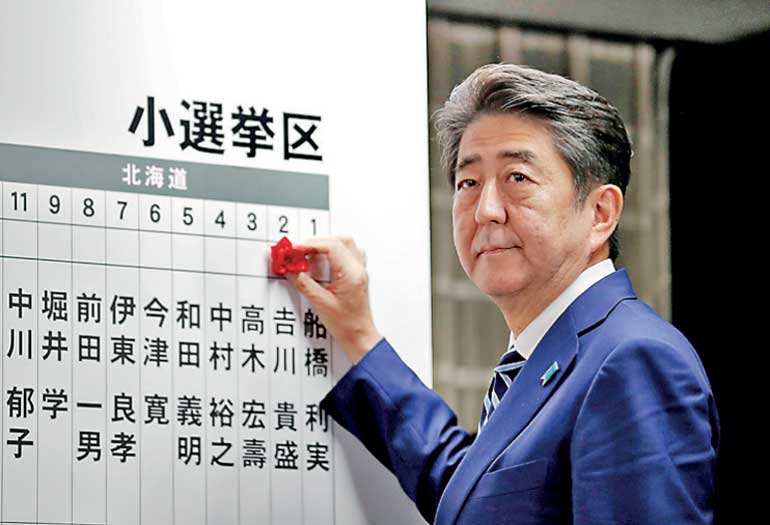Sunday Feb 22, 2026
Sunday Feb 22, 2026
Monday, 23 October 2017 00:00 - - {{hitsCtrl.values.hits}}
TOKYO (Reuters): Japanese Prime Minister Shinzo Abe’s ruling bloc was headed for a big win in Sunday’s election, bolstering his chance of becoming the nation’s longest serving premier and reenergising his push to revise the pacifist constitution.

Japan’s Prime Minister Shinzo Abe, leader of the Liberal Democratic Party (LDP), looks on as he puts a rosette on the name of a candidate who is expected to win the lower house election, at the LDP headquarters in Tokyo, Japan, October 22, 2017. REUTERS
Abe’s Liberal Democratic Party-led (LDP) coalition was set to win 311 seats, keeping its two-thirds “super majority” in the 465-member lower house, an exit poll by TBS television showed. Public broadcaster NHK also said the ruling bloc was closing in on a two-thirds majority, although some other broadcasters had the ruling bloc slightly below the two-thirds mark.
A hefty win raises the likelihood that Abe, who took office in December 2012, will have a third three-year term as LDP leader next September and go on to become Japan’s longest-serving premier. It also means his “Abenomics” growth strategy centred on the hyper-easy monetary policy will likely continue.
Final official results from the election, which coincided with an approaching typhoon, are expected early on Monday.
The U.S.-drafted constitution’s Article 9, if taken literally, bans the maintenance of armed forces. But Japanese governments have interpreted it to allow a military exclusively for self-defence.
Backers of Abe’s proposal to clarify the military’s ambiguous status say it would codify the status quo. Critics fear it would allow an expanded role overseas for the military.
Abe said he would not stick to a target he had floated of making the changes by 2020. “First, I want to deepen debate and have as many people as possible agree,” he told a TV broadcaster. “We should put priority on that.”
The LDP’s junior partner, the Komeito, is cautious about changing the constitution, drawn up after Japan’s loss in World War Two. Several opposition parties favour changes, but don’t necessarily agree on details.
Amendments must be approved by two-thirds of each chamber of parliament and then by a majority in a public referendum.
Abe had said he needed a new mandate to tackle a “national crisis” from North Korea’s missile and nuclear threats and a fast-aging population, and to approve his idea of diverting revenue from a planned sales tax hike to education and child care from public debt repayment. [reut.rs/2yC0pma]
He called the poll amid confusion in the opposition camp and an uptick in his ratings, dented earlier in the year by scandals over suspected cronyism and a perception he had grown arrogant after nearly five years in office.
Abe has backed U.S. President Donald Trump’s tough stance towards North Korea, which has test-fired missiles over Japan, that all options, including military action, are on the table. Trump is to visit Japan Nov. 5-7 to reaffirm the leaders’ tight ties.